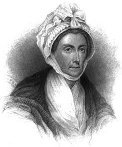Selina, the Less-than-Perfect Servant

Selina was discouraged. The evangelist John Wesley, her friend, had assured her that it was possible for Christians to attain a state of sinless perfection in this life. Try as she might, the strong-willed and devoted Selina could not accomplish this lofty goal. She felt her failure deeply, and wondered if she could ever be useful in the kingdom of God.
Selina Hastings, Countess of Huntingdon, was converted early in the Great Awakening of the eighteenth century. From the beginning, she was determined to use every asset she had in the service of God. She soon found ways to use her position in society to persuade many of the English nobility to listen to the gospel, especially as preached by the evangelist George Whitefield and the brothers John and Charles Wesley, leaders in the early Methodist societies in England.
This was no easy task, as the nobility frowned on the Methodist movement. For example, the Duchess of Buckingham described the movement as “repulsive and strongly tinctured with impertinence and disrespect toward their superiors.” While thousands of the common people of England flocked to hear the Wesleys and Whitefield preach in the open air, the Church of England tried to break up their meetings and made it increasingly difficult for Methodist preachers to be ordained. Selina used her influence with the king and others on behalf of the evangelists, going so far as to hire Whitefield as her personal chaplain to insure his ability to continue preaching in England.
Even though many of the nobility disapproved of Selina’s “excesses” in religious matters, others happily enjoyed her company. Selina filled her drawing rooms with musicians, poets, lords and ladies, statesmen, and philosophers for exciting discussions of religion. Often she asked Whitefield or another visiting evangelist to address the group. At the same time she was entertaining nobility in the drawing rooms, her kitchens might be filled with the poor and needy, to whom she dispensed both spiritual advice and material assistance. Selina took every opportunity to talk with her family, friends, and servants about God. Lady Huntingdon was also devoted to her husband and six children. But still, the perfection that John Wesley taught could be hers eluded Selina.
About this time, an older woman who lived on Huntingdon estate began to wonder what might happen to her own soul, should she die suddenly. Selina’s biographer recounts the story:
Speaking gently but firmly, the Countess pointed out the total inadequacy of any good works to save the soul. But that was not the woman’s problem. “It will not do,” she retorted, “I am too bad to be saved.” “Well, now that you are quite lost, you will find Him who came to seek and to save just such as you are,” was Selina’s reply. 1
Without knowing it, Selina had answered both the question of the elderly lady (who was later joyfully converted) and the problem of her own soul. She’d stumbled on the solution—dependence on divine grace. Even though our flesh (the part of our nature that is at enmity with God) was crucified with Christ (Romans 6:6), as Martin Luther said, “the old man dies hard.” Remnants of the flesh remain to be battled as long as we live in our present bodies. Someone able to live in a state of sinless perfection might no longer feel his or her need for a Savior. Instead we are compelled to realize our moment-by-moment dependence on the grace of God to save us, to keep us from sin, and to forgive us when we do sin.
Over time, with prayer, and after counsel from Whitefield, Selina did give up the doctrine of Christian perfection, but never stopped using her every asset for the kingdom. Some of her many and varied accomplishments include founding a theological seminary, funding the building of 64 chapels, financing missionaries, and personally paying the debts of dozens of men so that they might be released from debtors prison. The Countess founded a group of churches later called “Countess of Huntingdon’s Connexion,” some of which still exist today.
Did she do all these things without sinning? No. Selina was described as an autocratic ruler of the churches she founded and failed to set up Biblical church government in them, for one example. Still, at the end of her life, everyone who knew her believed she was a woman of tremendous faith. Thomas Wills, a man harshly treated by Selina, described her this way:
. . . one of the brightest luminaries that had ever shown in the Gospel hemisphere, though like other stars shining with a borrowed or reflected light. . . . Thousands, I say tens of thousands, in various parts of the kingdom have heard the gospel through her instrumentality that in all probability would never have heard it at all; and I believe through eternity will have cause to bless God that she ever existed. She was truly and emphatically a Mother in Israel, and though she was far from perfect in character, yet I hesitate not to say that among the illustrious and noble of the country she has not left her equal. 2
___________________________
1Cook, Faith, Selina, Countess of Huntingdon: Her Pivotal Role in the 18th Century Evangelical Awakening, Banner of Truth Trust 2001, p. 79-80.
2Ibid, p. 422.

